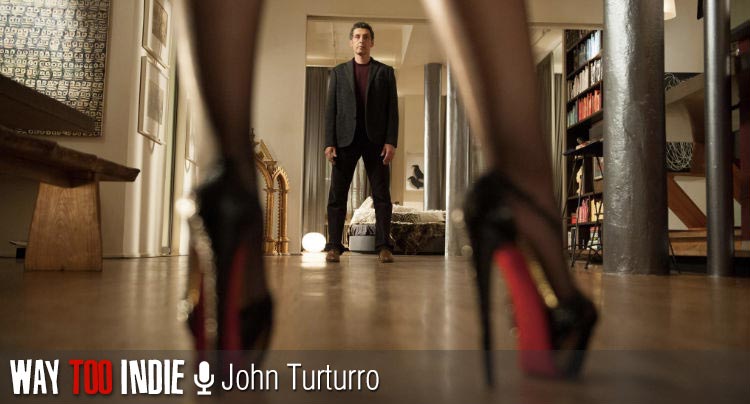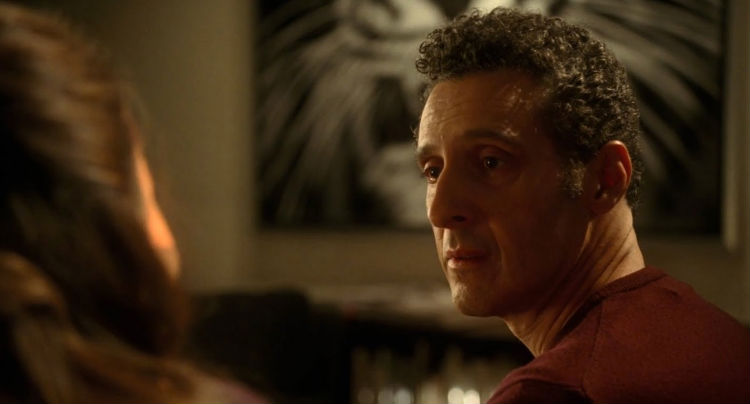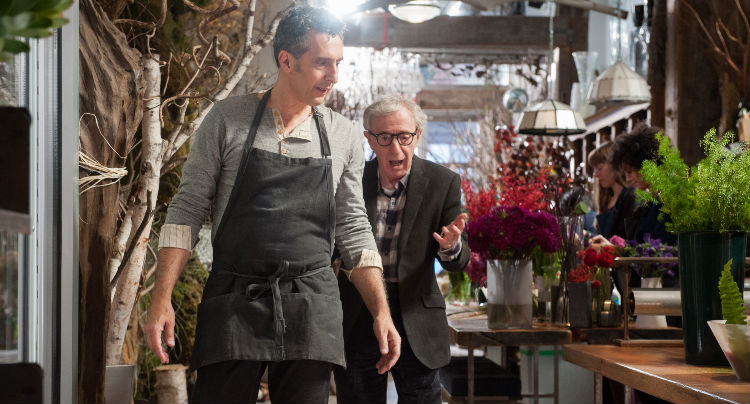John Turturro Talks ‘Fading Gigolo’, Woody Allen’s Brutal Honesty

John Turturro writes, directs, and stars in Fading Gigolo, a tender comedy about a stoic bookstore employee whose boss (Woody Allen) convinces him to become a male prostitute, acting as his pimp, essentially. Business is booming, but eventually, love, money, and religion begin to make their more complicated than they bargained for. The film also stars Vanessa Paradis, Liev Schreiber, Sharon Stone, and Sofia Vergara.
In the following edited roundtable press interview, Turturro spoke with us about experimenting with 8mm cameras, what he learned from the Coen brothers and Spike Lee, Allen’s brutally honest creative contributions to the film, his work with Adam Sandler and Michael Bay, and more.
The film opens with the closing of a book store. Was that meant as a commentary on the contemporary transition from old to new?
John: It was based on a friend of mine’s store. I thought of the idea of things fading away and then trying to reinvent yourself. I wasn’t trying to make a political statement so much, but I do think that with progress there is loss. The whole idea of the film being in the sex business, which is one of the oldest businesses…I didn’t want to explore the dark, exploitive side of it much at all, but I thought, there is a human transaction that goes on. I’m using it as a metaphor for intimacy.
With dating there’s a transaction there, too.
John: That’s right. When you look at these really wealthy guys with these beautiful younger women, there’s a real transaction that goes on there. Maybe that’s a more dishonest transaction.
The opening credits set the tone for the film really well.
John: I was doing an NPR radio show and we were talking about using 8mm. We talked about our childhood and 8mm. I had films of my family in 8mm. I decided to buy a camera and do some tests, and I loved how it looked without even treating it! It looked fantastic.

What’s it like directing yourself? Seeing as how you’ve worked with such great directors as the Coen brothers and Spike Lee, are there any specific things you picked up from those experiences?
John: You learn a lot from every director. They don’t reinvent the wheel, but…how to set up an environment is important, how you prepare, how specific you are in your visual palette. Once you’ve been exposed to that, you’re either interested in it or you’re not. I worked with Francesco Rosi, who’s done some of the most beautiful films you’ll ever see. You learn when you work with all these different people, but in the end, you’re the one who’s going to put together your visual palette. It’s going to be your taste.
Directing myself in some ways can be very easy if I have enough time. When I don’t have too much time, sometimes the tension of the day can affect your performance, and I need someone there to say, “You look a little tense. You’ve got to loosen up a little bit.” I think, in the end, when you’re directing, you expose who you are very quickly. If you don’t like people, it comes out. I’m in charge, but I like to create a relaxed environment that I would like to be a part of.
You have these great working relationships with the Coen brothers, with Spike Lee, but you’ve also balanced that out with other working relationships, more comedic ones like Adam Sandler and Michael Bay. Is that a conscious decision?
John: I have to make a living, man (laughs). Let’s be honest. I can’t depend on Spike Lee and Joel and Ethan. They’re my friends, but they may not have a part for me. Years ago, I never made those big movies because there were these really nice, medium-sized films that were made. Those no longer remain. This film isn’t exactly a medium-sized film, because if we had a medium-sized, real budget, we would have had 8-10 weeks to shoot it.
When I did my first thing with Adam Sandler, I was very picky about it. I had a very good time, because I took two characters and made them one. I did Transformers because I had turned down so many big movies that my son said, “Dad…just do it!” And I had a good time doing it. But I don’t live in that world. I find it fun, and then I’m exhausted by it. It’s not like when I do a Chekov play or a film with the Coens. There’s stuff that you get in that material that gives you something. Then, there’s other material that you do where you don’t really get that much back from it. That’s not why I wanted to be an actor, even though I had fun with Mr. Deeds and the Transformers movies. I don’t look down on it. I try to do a good job. But, if I was a painter, these roles are more like a sketch versus a detailed painting.
I have to make a living, and that allows me to go do a play. I’m not saying that in a derogatory fashion. I thought You Don’t Mess With the Zohan was really funny for a while, but I don’t think it finished what it started. There were some fantastic things behind it, but…the mind behind it just broke down. But its okay…there’s room for that. I’ve enjoyed working with Adam. I think he’s a good actor.
Is the way you and Woody speak in the film the way you talk in real life?
John: No, no. But our relationship is maybe similar to that. But that’s not how we really talk. Those conversations are written. It’s beaten down. If that’s how we really talked, it would have taken five days to write the script. Even if we improvised something off of it, which wasn’t that much, it was pretty solid. Then I’d say, “Spin it if you want. Try it.” Woody’s really great at that. I worked on the script for two years.

Woody’s seldom in movies these days, but he’s as sharp as ever here. He even gets to do some physical comedy.
John: He’s a wonderful, wonderful actor, and I think he did a brilliant job for me. I wanted to make a good film for him because it’s a privilege to work with him. He made a big contribution to the film in a lot of ways. I consider him a friend. To work with someone like that, who’s done what he’s done over the years…it’s really a privilege. I don’t take that lightly.
Did he have a hand in the creative process?
John: I’d write the script, and then he would give me his feedback. He’d tell me all the things he hated, which were many, and I would have to think about it. He wouldn’t tell me what to do, but he was completely uncensored and brutal. “I could be wrong…but I hate this.” He’s a musician. He comes from a world where, if you hit a bad note, it’s bad. In standup comedy, which he did, if you don’t get a laugh, you get a bigger laugh. He has a big appetite for drama. He’s a guy that likes Fellini and Bergman. He also likes the Marx Brothers. That’s a rare combination. There’s nobody like him. Nobody. Not now.
You did a lot of research on Hasidic Jews. Why was religion an appealing element to use for the film?
John: If you’re going to make a movie about sex, you have to have an obstacle. It could have been Catholic, Muslim, whatever. I was interested in the headdress. All these women’s heads are covered. I like films about religion very much so. I think it’s related. you’re talking about suppression. Even the other side of that, freedom that we see, where people are gyrating on commercials in people’s faces…that’s as unenlightened as people being suppressed. I think it’s the other side of the coin, and it interested me. Sex and religion go hand in hand.
